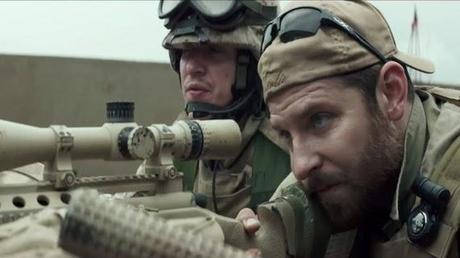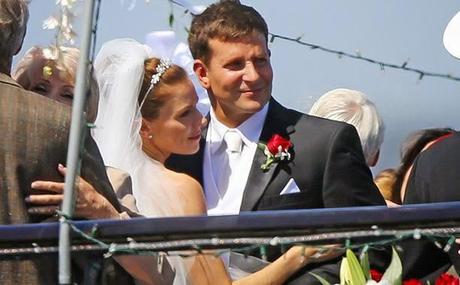 Clint Eastwood's American Sniper (2014) is this season's Gone Girl, an unassuming genre flick generating a thousand think pieces on its cultural significance. Eastwood's movie has more cause, drawing on a real person whose life and actions remain controversial. Nonetheless, it's an entertaining war movie with an excellent lead performance.
Clint Eastwood's American Sniper (2014) is this season's Gone Girl, an unassuming genre flick generating a thousand think pieces on its cultural significance. Eastwood's movie has more cause, drawing on a real person whose life and actions remain controversial. Nonetheless, it's an entertaining war movie with an excellent lead performance.Spinning his wheels in 1990s Texas, Chris Kyle (Bradley Cooper) joins the Navy SEALS after witnessing al-Qaeda's 1998 African Embassy bombings. When the US invades Iraq, Kyle becomes a front-line sniper, gaining a reputation as "The Legend" for his impossible marksmanship. Kyle's colleagues die around him, and Kyle grows wary of the seemingly-endless conflict. His home life also suffers, with wife Taya (Sienna Miller) chafing at his long absences and inability to connect. Kyle tries coming home, yet whether through duty, habit or post-traumatic stress he repeatedly returns to Iraq.
American Sniper starts from the Sergeant York vein before turning darker. Its hero is a bumbling, none-too-bright Everyman who washes out of school and bull-riding until finding the Navy. His simple, right-and-wrong worldview meshes well with the military: he's a hero protecting America from its enemies. He relishes camaraderie with SEALS and Marines alike, finding military brotherhood simpler than family complications. Yet he becomes increasingly defined by killing people: at one point, a personal vendetta overtakes tactical considerations.
Eastwood packs Sniper with graphic battle scenes, exciting individually but cumulatively exhausting. Iraq is an anarchic wasteland where everyone's a potential enemy, with even children toting grenade launchers. This is less demonizing Arabs is than a product of limited perspective: Kyle's patriotism doesn't question the war's righteousness, measuring its human cost in lost colleagues rather than Iraqi lives. Kyle himself isn't above stupid mistakes that endanger his colleagues. Like Sniper's hero, we soon grow exhausted with the endless carnage.
Sniper intersperses combat with Kyle's spells at home. These scenes are problematic. On the one hand, Eastwood handles Kyle's PTSD with sensitivity: he can't adjust to civilian life, wracked by guilt and painful memories. His instincts kick in at the worst time, when a neighborhood dog plays too rough with his kid. His scenes with Taya, however, provide another wife who can't understand the hero's suffering. A shame, as Taya's early scenes suggest a more complex spousal figure than war movies usually provide. Fortunately, Kyle finds solace helping other veterans adjust.
 Unsurprisingly, Eastwood takes liberties with the truth. There's Kyle's ongoing rivalry with Mustafa, an al-Qaeda marksman mentioned only in passing in Kyle's book. Worst is a melodramatic scene where Kyle chats with Taya during a ferocious firefight, which never happened and plays incredibly false. And Kyle was hardly as disillusioned as Sniper's later scenes depict. Then again, Kyle himself was prone to brazen exaggeration, whether cold-cocking Jesse Ventura or shooting looters after Hurricane Katrina. Eastwood's dramatic fictions seem less egregious than Kyle's own.
Unsurprisingly, Eastwood takes liberties with the truth. There's Kyle's ongoing rivalry with Mustafa, an al-Qaeda marksman mentioned only in passing in Kyle's book. Worst is a melodramatic scene where Kyle chats with Taya during a ferocious firefight, which never happened and plays incredibly false. And Kyle was hardly as disillusioned as Sniper's later scenes depict. Then again, Kyle himself was prone to brazen exaggeration, whether cold-cocking Jesse Ventura or shooting looters after Hurricane Katrina. Eastwood's dramatic fictions seem less egregious than Kyle's own.Really, liberal criticism of American Sniper centers around it not loudly condemning the Iraq War and Kyle himself as a war criminal. Criticizing a movie's politics is fair game, but Sniper isn't more odious than 1,000 other war movies you'd care to name. Perhaps these commentators are just upset that it's better than all the ponderous anti-Iraq War flicks which have come and gone without notice. Five years after it won Best Picture, who even remembers The Hurt Locker?
Bradley Cooper helps with a complex turn. Beefed up and sporting a passable Texas accent, he catches Kyle's redneck homeliness without denigrating the character. Cooper doesn't get the powerhouse moments that Oscar voters love, conveying Kyle's torment instead through muttered lines, avoided glances and facial resolution. Kyle isn't a character given to angry outbursts, channeling his pent-up rage into combat. Cooper makes Kyle complex and sympathetic, a believable hero with rough edges and credible failings.
American Sniper is an old-fashioned combat picture that's provoked an unexpectedly fierce debate. It's fair to question whether the genre's flag-waving hero worship isn't hopelessly anachronistic in 2015 - especially for a war as messy as Iraq, and a man like Chris Kyle. Comparing Sniper to Leni Riefenstahl is dense and provocative.

